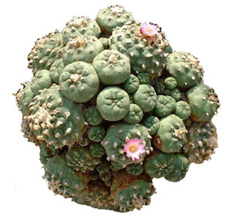Long Term Effects of Mescaline
Mescaline, a hallucinogenic substance derived from plants, produces “out-of-body” experiences or “trips,” any one of which can be pleasurable or disturbing. Certain types of meditation practices and therapy approaches also employ mescaline as a catalytic agent.
Mescaline interacts with the brain’s cognitive and emotion-based centers, oftentimes placing users in vulnerable and even helpless states of mind. With frequent drug use, the long term effects of mescaline can severely compromise a person’s psychological well being.
In the case of chronic drug use, the long term effects of mescaline leave users physically dependent, which poses considerable risks to a person’s overall health. With continued drug use, the long term effects of mescaline take the form of addiction where a person’s lifestyle revolves around getting and using the drug.
Mescaline

Mescaline is found within the nodules of Peyote plants.
Mescaline exists in nature inside the button-sized nodules of the Peyote cactus and Fabaceae bean, as well as in synthetically formulated drugs. As a synthetic drug, mescaline appears as a white, crystallized material known as mescaline sulfate.
According to the University of Maryland, mescaline acts as a psychoactive agent that easily interacts with the brain’s chemical system. Since it has no known medical purpose, mescaline falls under the Schedule I classification of controlled substances, all of which are narcotics. The long term effects of mescaline factor into why this drug holds a Schedule I classification.
While Schedule I class drugs are considered illegal under federal law, the traditional use of mescaline in Native American ritual ceremonies has allowed for an exception for members of the Native American Church.
Long Term Effects of Mescaline
Physical Dependency & Withdrawal Effects
In general, hallucinogen drugs carry a low potential for physical dependency; however, frequent and ongoing use places users at increased risk of dependency. Physical dependency develops out of the long term effects of mescaline on brain chemical functions.
With each dose, mescaline sets off a series of chemical reactions, releasing copious amounts of neurotransmitter chemicals throughout the brain and central nervous system. Dosage amounts ingested, length of time using and frequency of use all factor into how quickly a person becomes dependent on the drug.
Once physical dependency sets in, users start experiencing withdrawal effects as the brain’s tolerance levels continue to rise. In effect, withdrawal effects reflect the overall state of chemical imbalance present in the brain. With continued drug use, a full-blown addiction will soon develop.
Mescaline withdrawal effects typically take the form of:
- Tremors
- Drastic changes in body temperature
- Elevated heart rate
- Labored breathing
- Seizures
- Muscle stiffness
- Psychotic episodes
- Drastic mood swings
- Panic attacks
- Violent outbursts
- Garbled speech patterns
Hallucinogen Persisting Perception Disorder
For chronic drug users, the long term effects of mescaline can cause a medical condition known as Hallucinogen Persisting Perception Disorder or HPPD to develop over time. According to Columbia Health, people affected by HPPD experience continuous flashbacks of previous drug “trips.”
Flashbacks can happen at any given time, which greatly hampers a person’s ability to function in daily life. HPPD symptoms can persist for years after a person stops mescaline use.
- Related Articles
 10 Effects of Mescaline You Should Be Aware Of -
Mescaline can cause a variety of adverse physical and psychological effects.
10 Effects of Mescaline You Should Be Aware Of -
Mescaline can cause a variety of adverse physical and psychological effects.  Is Peyote Addictive? -
While peyote - and most other hallucinogens - is not widely considered to be addictive, the drug can cause a psychological dependence to develop, and there isn't a safe way to use it.
Is Peyote Addictive? -
While peyote - and most other hallucinogens - is not widely considered to be addictive, the drug can cause a psychological dependence to develop, and there isn't a safe way to use it.  Harmful Effects of Peyote -
Peyote is a strong drug, and its effects are highly unpredictable, as well as long-lasting. When on peyote, a person may harm themself or others, or get into accidents.
Harmful Effects of Peyote -
Peyote is a strong drug, and its effects are highly unpredictable, as well as long-lasting. When on peyote, a person may harm themself or others, or get into accidents.  10 Common Peyote Side Effects -
Find out about the various side effects associated Peyote, which differ from other hallucinogens.
10 Common Peyote Side Effects -
Find out about the various side effects associated Peyote, which differ from other hallucinogens.  15 Reasons to Stop Using Mescaline Today -
Learn the many dangers and consequences of abusing mescaline, and how to get treatment help.
15 Reasons to Stop Using Mescaline Today -
Learn the many dangers and consequences of abusing mescaline, and how to get treatment help.